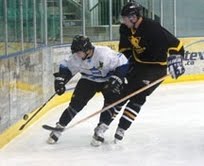For those of you that follow my articles (thank you very much by the way), you know that I often write about transition, be it in the gym, on the ice and in game situations. For those that are fairly new, hopefully I can provide you with a new outlook on the game of golf.
Summer has just begun. For most hockey players that should mean a couple things: Spring hockey is rolling to an end and/or you’re in the midst of your off-season training program (hopefully, contact me if you haven’t started). One other thing is important in the lifestyle of hockey, that’s golf.
Golf is a great “transition” sport during the off-season. It allows you to remove your mind from possibly one of the roughest season’s you may have experienced or it could simply be a means to keep your athleticism high. Whatever the circumstance, golf has multiple benefits.
Time away from hockey gives you the opportunity to increase your mental preparedness for next season. Please don’t take that out of context. I’m not saying that you need to focus on next season right now, at least not from a mental aspect. Actually, one of the best things that you can do is force yourself to look beyond to the past. It is exactly that… the past. Golf can be a good breakaway from that. The game itself requires a magnitude of focus. I’m not even talking about the realm of trying to fix your swing. That attention to detail is a good thing. It sharpens our perception of focus.
From a strength and conditioning standpoint, there’s significant benefit to developing increased focus. Golf is highly biomechanical. Even the slightest change in posture, muscle activation, and movement mechanics can drastically affect your play. Learning to focus energy can teach hockey players to actively engage muscles that can result in greater performance on the golf course and on the ice.
Why is that important? Hockey players need to develop ways to utilize ALL available energy systems in order to create the highest level of strength, power, speed and agility. This results in quicker, more explosive movement on the ice. It can change your game in 3 strides. Also, golf utilizes many of the same forceful actions as hockey. Golf requires a strong core and hip complex. The great Ben Hogan said that hitting balls every day made him stronger, resulting in better performance.
Clearly, golf is not a replacement for a solid off-season training program, but it can facilitate movements that are conducive to increased performance for the up-coming season. As you progress through your off-season training program, golf can also provide a gauge to your performance enhancement. Sure an increase in driving yardage could be related to mechanics, but if you are training correctly it could be an indication of increased strength and power from your weightroom training.
When I speak of transition, I’m talking about finding ways to remain athletic, but also shifting the paradigm of off-ice training. Preparation for intense training also requires a high level of recovery. Golf is athletic, but not so physically demanding that your body is prevented from recovery. It’s actually counterintuitive to do nothing during your transition phase of training. Cardiovascular levels drop considerably fast if you allow yourself to do nothing. Golf is exactly that, a great way to remain active.
Forget about last season, it’s in the past. Focus on your mental state, prepare your mind and body for the next season properly. Always remain active by focusing energy on your athleticism. Get on the range or course and focus on lowering your handicap. Your hockey game will be better for it.
This article was written by hockey training specialist Christopher Costa. Chris’s life has revolved around hockey, as a coach, player and official for 22 years. His training protocols address all key aspects in producing elite talent, as well as nutrition. His passion is to help elite hockey players achieve the highest level of performance. In 2012 he worked with the Philadelphia Flyers organization and is currently pursuing a Master’s degree in Human Performance.
















